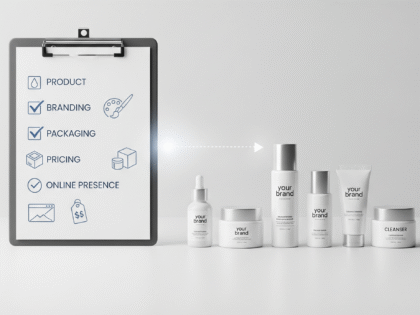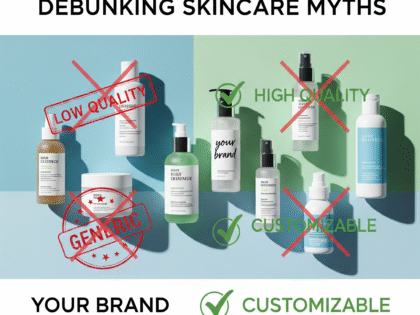Vitamin C Serum Uses, Benefits And Side Effects

Vitamin C serum might be your golden ticket if you’ve been looking to simplify your skincare routine or amp it up. Topical vitamin C is a multipurpose workhorse that can protect, repair, and enhance your skin. The following blog is a detailed guide on vitamin C serum.
Introduction
“Vitamin C is a hot topic, and it is buzzworthy because it has so many preventive and maintenance benefits.”
-Nazanin Saedi, MD, a board-certified dermatologist and a clinical associate professor at Thomas Jefferson University in Philadelphia.
Vitamin C, also known as Ascorbic Acid, is a vital nutrient that plays a significant role in various bodily functions. Not only is the vitamin beneficial in boosting immunity, incrementing collagen synthesis, and providing a brighter complexion when taken orally, but it also leaves tremendous impacts when applied on the skin tropically via skin care products, including serums and toners. The necessity of vitamin C for the body can be acknowledged by the fact that its deficiency can cause severe issues like scurvy on the skin, bleeding gums, easy bruising, and small red spots on the skin (petechiae).
By now, you may be thinking about vitamin C, which, if in deficiency, can be increased by enhancing its intake in your diet to reap these benefits. Unfortunately, simply eating more oranges and cantaloupe isn’t going to cut it. That’s because the epidermis, the outermost layer of the skin, doesn’t have blood vessels to send nutrients to the skin cells, research notes. Among tropical skincare products, Vitamin C serum is one of the best skincare products that can do wonders when it comes to filling the lag of vitamin C.
Why Vitamin C Serum?
Now, the question arises of why Vitamin C serum is used and why not other Vitamin C-based products. It is not the point that other skincare products rich in vitamin C have nothing in essence, but the main point is serums penetrate the skin way more deeply and efficiently than all other skincare products. Therefore, adding Vitamin C serum to your routine is the best choice to enhance vitamin C in the body, thus harnessing the best out of any skincare.
What is Vitamin C Serum?
Vitamin C serum is a wellness or skin-care product that has Vitamin C, or L-ascorbic acid, as the main component. It has the consistency of a gel or liquid and is applied topically to the skin. You’ll find these serums wherever you purchase skin-care products — at department stores, beauty stores, and some drugstores, too. On the packaging, you’ll likely see words touting skin benefits like “firming,” “brightening,” and “collagen boosting.” People add vitamin C serum to their skin-care routines to tap into those benefits.
Vitamin C Serum Uses
As mentioned earlier, vitamin C is a vital component of the human body. Given tropically as serums, the miraculous ascorbic acid has numerous skin-benefiting properties. Some of them are as follows.
1- Antioxidant Properties
Being a strong antioxidant, vitamin C assists in the elimination of free radicals. Unstable molecules called free radicals overwhelm the body’s natural antioxidant defences and create oxidative stress, a state that damages cellular components, including skin cells. As a result, ageing symptoms like fine lines and wrinkles, as well as the chances of getting skin cancer, are exacerbated. The antioxidant properties of Vitamin C in serum protect the skin from oxidative stress caused by external factors such as pollution, smoking, and UV radiation caused by scavenging free radicals.
2- Collagen Synthesis
Further, Vitamin C serums can help the skin replenish the collagen level in the skin. Collagen is a protein that helps the skin maintain its structure.
SKIN WITH COLLAGEN VS SKIN WITHOUT COLLAGEN
Vitamin C promotes collagen synthesis, necessary for skin elasticity and firmness. Being rich in the hydroxylation of proline and lysine, the L-ascorbic acid is essential in forming collagen fibres. Thus, vitamin C serum promotes collagen synthesis, assisting in the establishment of firm and youthful skin.
3- Hyperpigmentation Reduction
Moreover, Vitamin C interferes with the enzyme tyrosinase, which is crucial for melanin synthesis. A systematic review published in the Journal of Clinical and Aesthetic Dermatology examined the effects of topical vitamin C on skin pigmentation. The review highlighted a clinical study where participants with melasma applied a 25% vitamin C formulation for 16 weeks, resulting in a significant decrease in pigmentation. Thus. Vitamin C serums help reduce the appearance of dark spots and hyperpigmentation.
4- Skin Brightening
Moreover, Vitamin C serum plays a crucial role in enhancing overall skin brightness, giving it a healthy and radiant glow. The active ingredient, ascorbic acid, reduces hyperpigmentation and gives the even glow your skin deserves. A meta-analysis highlighted by Healthline supports this mechanism, noting that vitamin C serum can lighten skin by inhibiting tyrosinase activity, thereby reducing melanin formation.
5- Anti-Inflammatory Effects
Vitamin C has anti-inflammatory properties, which help to soothe and calm irritated skin. It can help to reduce redness and inflammation caused by conditions like acne or rosacea, a long-term skin condition that typically affects the face. It results in redness, pimples, swelling, and small and superficial dilated blood vessels. The application of vitamin C through serum helps our skin get rid of stubborn acne and skin anomalies with deep penetration, ensuring maximum efficiency.
6- Sun Damage Protection
Although Vitamin C serum does not replace sunscreen, it can complement sun protection efforts. It helps neutralize free radicals generated by UV exposure and supports the skin’s natural defence mechanisms. According to the research done by Oregon State University, Vitamin C possesses photoprotective properties, increasing protein transport in keratinocytes in response to UV light, suggesting an increased need for vitamin C uptake for adequate protection.
Vitamin C Serum for the Face Benefits
Considering all the mentioned benefits of vitamin C serums, if you are looking for Vitamin C serum for the face, it is the best choice as it is equally helpful for all skin types. However, some people may have skin sensitivity from vitamin C serums, particularly when the concentration is higher. So, it’s best to start with lower amounts to minimize irritation. Gradually increase from lower amounts to reduce the chance of irritation. Individual reactions can also differ, just like with any chemical in skincare products; therefore, it’s best to conduct a patch test and, if necessary, get advice from a dermatologist.
Vitamin C Serum for Acne
Acne is a skin condition that occurs when your hair follicles become plugged with oil and dead skin cells. It causes whiteheads, blackheads or pimples. Acne is most common among teenagers, though it affects people of all ages. The main culprits responsible for acne are age, genetics, and hormones. Moreover, certain strains of the common skin bacterium Cutibacterium acnes (C. acnes) may trigger this condition.
Use Base Natural Sunshine Splash Vitamin C serum on acne-prone skin can be beneficial to deal with the issue. However, it is important to be cautious before starting any new skincare routine, especially if you have severe acne or any other skin conditions. Following are the benefits vitamin C serum can provide in removing and eliminating acne.
1- Reduces Inflammation caused by Acne
Vitamin C has strong anti-inflammatory properties, which can help calm redness and irritation caused by acne. When the skin experiences breakouts, it often becomes inflamed due to bacterial activity and an overactive immune response. By reducing inflammation, Vitamin C serum soothes the skin, making pimples appear less red and swollen. This effect helps in improving the overall skin texture and reducing the severity of acne flare-ups.
2- Improves the Appearance of Acne Scars
One of the major concerns post-acne is scarring and hyperpigmentation. Vitamin C serum, with vitamin C in its active form (ascorbic acid), helps in collagen synthesis, which plays a key role in skin repair. Collagen production is necessary to heal damaged skin and improve the texture of acne scars over time.
3- Regulates Sebum Production
Moreover, vitamin C serum helps regulate excess sebum (oil) that causes acne since it clogs pores, leading to blackheads, whiteheads, and pimples. Vitamin C helps regulate sebaceous gland activity, reducing oil production without overly drying the skin. By keeping sebum levels balanced, Vitamin C minimizes the chances of clogged pores, thereby preventing new acne breakouts.
4- Combats Acne-Causing Bacteria
Vitamin C’s antimicrobial properties in vitamin C serum may help in reducing Propionibacterium acnes (P. acnes)—the bacteria responsible for inflammatory acne. By limiting bacterial growth on the skin, Vitamin C serum contributes to a healthier complexion and minimizes the risk of infected breakouts.
Vitamin C Serum Side Effects
Vitamin C serums are usually safe, but using them without knowing your skin type can cause side effects like
1- Irritation and Redness
Using vitamin C serum on sensitive skin can cause redness, itchiness, and irritation.[10] However, this is not the case for everyone and every serum. If you are one with sensitive skin, two essential points must be taken into consideration. First, use a serum with a relatively low concentration of vitamin C so that you can harness the benefits of vitamin C without getting affected.
2- Photosensitivity
Although vitamin C can help the skin get protection from UV radiation, even if nectar is consumed in excess it is poisonous. Likewise, the overuse of vitamin C serum can make the skin prone to UV radiation, that is, it causes photosensitivity. Make sure to apply your vitamin C serum no more than a pea-sized drop twice a day.
3- Purging or Breakouts
Additionally, Vitamin C serum, when combined with other skincare products with actives like retinol or AHA/BHA. According to expert studies, it is essential to look for the compatibility of vitamin C with other activities before applying. For instance, hyaluronic acid and vitamin C are compatible and good to be used together. Moreover, avoid layering too many active ingredients.
4- Dryness
Vitamin C for skin can make the skin dry. Therefore, it is recommended that a moisturizer must be followed after the usage of vitamin C serum either in the daytime and a moisturizer plus sunscreen of, on average, 30 SPF in the evening or at night and Learn more about 6 Fruits for Glowing Skin in Winter.
Using Vitamin C serum during pregnancy
Vitamin C serum is generally considered safe to use Vitamin C serum during pregnancy, as long as it is used in the appropriate concentration and formulation and applied topically. Topical Vitamin C is considered safe, as it is not absorbed into the bloodstream and is unlikely to cause any harm to you or your baby. However, it’s always best to speak with your healthcare provider or a skincare professional before starting any new skincare routine, especially during pregnancy and Learn more about the Vitamin C important for skin health.
How to choose a vitamin C serum
There are plenty of vitamin C products on the market at a variety of price points. Here are some things to look for:
- The right ingredients: Vitamin C serum doesn’t always say “vitamin C serum” on the packaging. Look for a product that says “ascorbic acid” or “L-ascorbic acid,” which is vitamin C that’s specially formulated for your skin.
- 10%–20% concentration: Seek out a serum that’s not too weak or too strong. Under 10% ascorbic acid won’t convey the benefits you’re looking for, but anything higher than 20% risks seriously irritating your skin.
- No clear bottles: Vitamin C serum’s sunset glow can be pretty, but if it’s packaged well, you shouldn’t be able to tell. This ingredient is sensitive to sun, heat and light, so go for a product that’s protected in dark or tinted glass.









